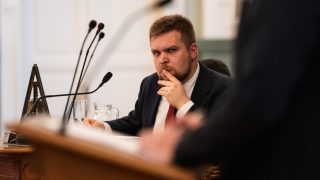What would happen if the General Staff found out you gave an interview?
I hope I get fired.
And if they don’t go that far?
It’s hard to say. It could range from a fine to imprisonment.
What if you were told that you’re getting deployed to Chad in two weeks, staying there for a year and a half?
As long as the threat of three years’ imprisonment is a stronger deterrent, people are forced to cooperate in the hope of that maybe someday they’ll be free. As for me right now, I’ve been in the process of discharge for almost nine months, so of course, I’d reconsider. A prison sentence doesn’t seem like such a bad option anymore.
*
In April 2020, during the COVID-19 pandemic, a government decree was issued stating that members of the Hungarian Defence Forces – both with definite and indefinite contracts – cannot voluntarily leave the forces. “It is justified, based on the experiences of the state of emergency, to introduce regulations that, in view of the declaration of a special legal order, generally restrict the rights of personnel serving in the forces. The personnel of the Hungarian Defence Forces must be available in these situations” – argued the government in support of the discharge ban at the time.
A year and a half later, we reported on how more and more soldiers were frustrated by this binding policy, and the situation has only worsened since then. On February 24, 2022, Russia invaded Ukraine, and on March 1, 2022, the Hungarian government declared a state of emergency due to war, still in effect today (currently planned to be extended again for another 180 days, until March). Releasing soldiers therefore remains off the table, although many would leave if they could – we detailed this issue more extensively in the autumn of 2022.
Our interviewee, who joined the military nearly ten years ago, is one of them: he made the decision in the beginning of the year to close this chapter of his life. He was not allowed to.

Gábor – whose name has been changed at his request – has wanted to serve in the military since the days of his youth. We cannot describe his exact position, only that he was in the air force until recently. He grew to love military aviation for several reasons: he found a profession he could call his calling, and “military aviation is a closed world within the closed world of the military, with an atmosphere that’s very easy to fall in love with and make your own.”
For a long time, he felt he was in the right place. He doesn’t regret becoming a soldier –
Gábor graduated from the National University of Public Service in 2017. For many years, he felt comfortable within the ranks of the military, unbothered by the dangers he and his comrades had to perform in the face of. He explained it was no problem, especially since during the 2015 migrant crisis, volunteers could earn good money via border duty; while during the COVID-19 pandemic, when it briefly seemed like the global economy might collapse, the military provided a sense of security.
However, the government decree introducing the discharge ban at the time was already a bad omen, and with this year’s reorganisation of the military, Gábor believes a completely new world has emerged.






